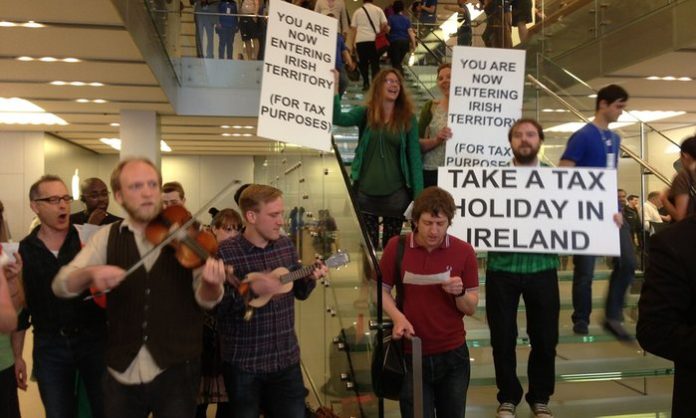EU ruling against Apple’s Irish tax arrangements has made it clear that either you can have jobs or taxes and Apple is in no mood to deliver both.
After learning that the EU expects Apple to pay €13 billion (£11 billion, $14.5 billion) in back taxes on Wednesday, the company said, “it will have a profound and harmful effect on investment and job creation in Europe.”
Technically, it’s not a threat but it will be seen as one by EU politicians, who want to attract new companies to their countries.
Back in 1991, Apple struck a tax deal with Ireland that was completely above-board and legal. The Irish government provided Apple with a “comfort letter” that said if it based its European operations in Ireland, it would pay very low rates of tax.
In the 15 years since, Apple has created thousands of jobs in Ireland. By 2015 it had 5,000 employees in the country. Another 1,000 jobs are planned for the HQ in Cork. This year, Apple will open its Athenry site, with another 200 jobs in the making.
The deal between Apple and Ireland was pretty clear: Give us low taxes and we will give you jobs. A note from a meeting between the government and an Apple tax advisor in 1990 basically said exactly that: “Apple was now the largest employer in the Cork area with 1,000 direct employees and 500 persons engaged on a subcontract basis. It was stated that the company is at present reviewing its worldwide operations and wishes to establish a profit margin on its Irish operations.”
Apple is now the single largest taxpayer in Ireland, so it has the kind of negotiating strength to get what it wants.
Apple has noted that its tax arrangements were agreed to repeatedly by Ireland’s government. The European Commission itself says the agreements were legal, albeit mistaken. But Margrethe Vestager, the EU’s competition commissioner, made Apple’s Irish tax arrangements sound like a scam:
- Apple’s effective European tax rate was 1%, on sales of €16 billion or more per year.
2. It sunk as low as 0.005% in 2014.
3. Apple created a head office that did not exist: “This ‘head office’ had no operating capacity to handle and manage the distribution business, or any other substantive business for that matter. … The ‘head office’ did not have any employees or own premises.”
4. The pact deprived other European countries of billions of euros in unpaid taxes.
Perhaps the most serious part of Vestager’s case against Apple is the way it contradicts Apple’s longstanding assertion that it does not pay corporation taxes in the US because its foreign (i.e. non-American) revenues are reinvested in the foreign territories that earn them. Apple’s annual report has said, “substantially all of the Company’s undistributed international earnings intended to be indefinitely reinvested in operations outside the U.S. were generated by subsidiaries organized in Ireland, which has a statutory tax rate of 12.5%.”
That 12.5% rate appears to have been Irish mist. The European money was actually being funnelled back to the US, Vestager says. Apple’s Irish operations had a cost-sharing agreement with the US HQ in which they were allowed to use Apple’s intellectual property if, in return, they paid for the R&D expenses to create that IP. The EC statement says:
“Under this agreement, Apple Sales International and Apple Operations Europe make yearly payments to Apple in the US to fund research and development efforts conducted on behalf of the Irish companies in the US. These payments amounted to about US$ 2 billion in 2011 and significantly increased in 2014. These expenses, mainly borne by Apple Sales International, contributed to fund more than half of all research efforts by the Apple group in the US to develop its intellectual property worldwide.”
(Critics may also ask how many more jobs would have been created in Europe if the money generated in Europe had actually stayed in Europe.)
Vestager’s ruling will also be read as a threat by dozens of other international companies who previously used Europe’s flexible tax arrangements. The European Commission concluded in October 2015 that Luxembourg and the Netherlands granted tax advantages to Fiat and Starbucks. It is currently investigating Amazon and McDonald’s.
The ruling will be appealed. It will be years before it is resolved. It won’t hurt Apple – the €13 billion in unpaid tax is roughly equivalent to only one month’s revenue, and Apple has always kept a massive amount of cash stashed in foreign countries precisely because it does not want to move it into jurisdictions where it might be taxed.
The more immediate problem is whether global companies will even bother with Ireland in the future if they cannot get the tax breaks they want … and whether that, in the long term, will reduce the total tax take in Europe.
With that in mind, Apple published a longer statement this morning, reiterating the link between jobs and taxes: “Beyond the obvious targeting of Apple, the most profound and harmful effect of this ruling will be on investment and job creation in Europe. Using the Commission’s theory, every company in Ireland and across Europe is suddenly at risk of being subjected to taxes under laws that never existed. … We are committed to Ireland and we plan to continue investing there, growing and serving our customers with the same level of passion and commitment.”
Sourced from businessinsider.in, Featured image courtesy: www.theguardian.com


























